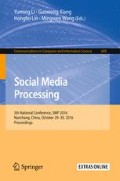Abstract
Supervised event extraction methods suffer from the lack of high-quality event corpora. Active learning is applied to improve the efficiency of manual annotation. In particular, we introduce the uncertainty of argument classification into the active learning for pipeline and joint extraction models. For the pipeline model, we drive active learning to identify and annotate the most informative instances at each extraction stage. It proceeds step-by-step and iteratively until the extraction at each stage reaches the optimal state. While for the joint model, we incorporate active learning with structural perceptron to identify the informative and interdependent event constituents. Experiments on ACE 2005 English corpora show that active learning for pipeline and joint model yield promising improvement.
Access this chapter
Tax calculation will be finalised at checkout
Purchases are for personal use only
References
Liao, S., Grishman, R.: Using prediction from sentential scope to build a pseudo co-testing learner for event extraction. In: Proceedings of the 5th International Joint Conference on Natural Language Processing, pp. 714–722 (2011)
Ji, H., Grishman, R.: Refining event extraction through cross-document inference. In: Proceedings of the Meeting of the Association for Computational Linguistics, 15–20 June 2008, Columbus, Ohio, USA, ACL 2008, pp. 254–262 (2008)
Hong, Y., Zhang, J., Ma, B., Yao, J., Zhou, G., Zhu, Q.: Using cross-entity inference to improve event extraction. In: Meeting of the Association for Computational Linguistics: Human Language Technologies, pp. 1127–1136 (2011)
Li, Q., Ji, H., Huang, L.: Joint event extraction via structured prediction with global features. In: ACL (1), pp. 73–82 (2013)
Grishman, R., Westbrook, D., Meyers, A.: NYU’s English ACE 2005 system description. J. Satisf. 51(11), 1927–1938 (2005)
Ahn, D.: The stages of event extraction. In: Proceedings of the Workshop on Annotating Reasoning About Time Events, pp. 1–8 (2006)
Liao, S., Grishman, R.: Using document level cross-event inference to improve event extraction. In: Proceedings of the 48th Annual Meeting of the Association for Computational Linguistics, pp. 789–797. Association for Computational Linguistics (2010)
Li, P., Zhou, G., Zhu, Q., Hou, L.: Employing compositional semantics and discourse consistency in Chinese event extraction. In: Joint Conference on Empirical Methods in Natural Language Processing and Computational Natural Language Learning, pp. 1006–1016 (2012)
Chen, Y., Xu, L., Liu, K., Zeng, D., Zhao, J.: Event extraction via dynamic multi-pooling convolutional neural networks. In: The Meeting of the Association for Computational Linguistics (2015)
Ringger, E., Mcclanahan, P., Haertel, R., Busby, G., Carmen, M., Carroll, J., Seppi, K., Lonsdale, D.: Active learning for part-of-speech tagging: accelerating corpus annotation. In: Linguistic Annotation Workshop, pp. 101–108 (2007)
Tomanek, K., Hahn, U.: Semi-supervised active learning for sequence labeling. In: Proceedings of the Meeting of the Association for Computational Linguistics and the International Joint Conference on Natural Language Processing of the AFNLP, 2–7 August 2009, Singapore, ACL 2009, pp. 1039–1047 (2009)
Roth, D., Small, K.: Active learning for pipeline models. In: AAAI Conference on Artificial Intelligence, pp. 683–688 (2008)
Acknowledgments
This research is supported by the National Natural Science Foundation of China, No. 61672368, No. 61373097, No. 61672367, No. 61272259. The authors would like to thank the anonymous reviewers for their insightful comments and suggestions. Yu Hong, Professor Associate in Soochow University, is the corresponding author of the paper, whose email address is tianxianer@gmail.com.
Author information
Authors and Affiliations
Corresponding author
Editor information
Editors and Affiliations
Rights and permissions
Copyright information
© 2016 Springer Nature Singapore Pte Ltd.
About this paper
Cite this paper
Wang, K. et al. (2016). A Case Study on Active Learning for Event Extraction. In: Li, Y., Xiang, G., Lin, H., Wang, M. (eds) Social Media Processing. SMP 2016. Communications in Computer and Information Science, vol 669. Springer, Singapore. https://doi.org/10.1007/978-981-10-2993-6_11
Download citation
DOI: https://doi.org/10.1007/978-981-10-2993-6_11
Published:
Publisher Name: Springer, Singapore
Print ISBN: 978-981-10-2992-9
Online ISBN: 978-981-10-2993-6
eBook Packages: Computer ScienceComputer Science (R0)

